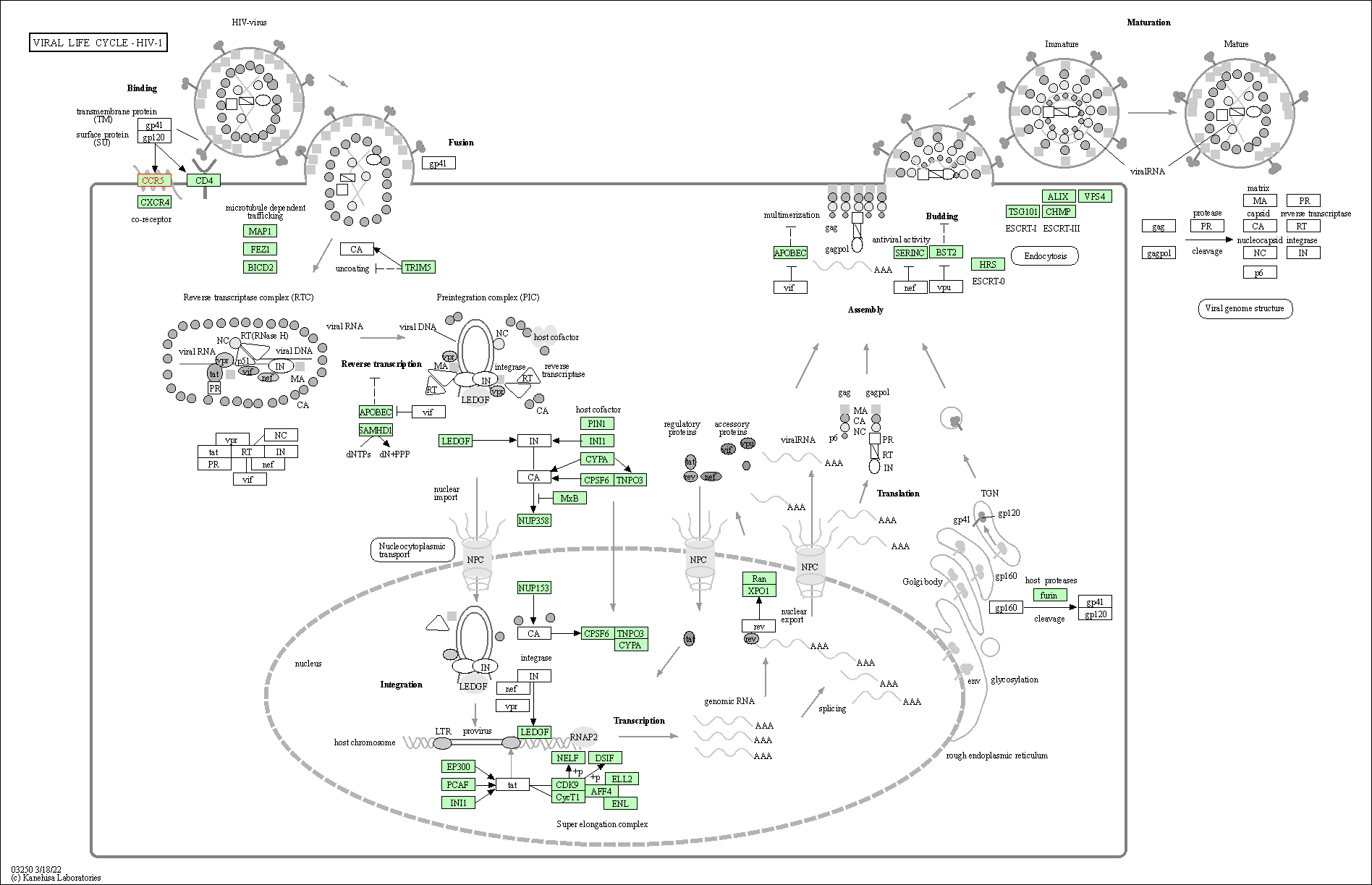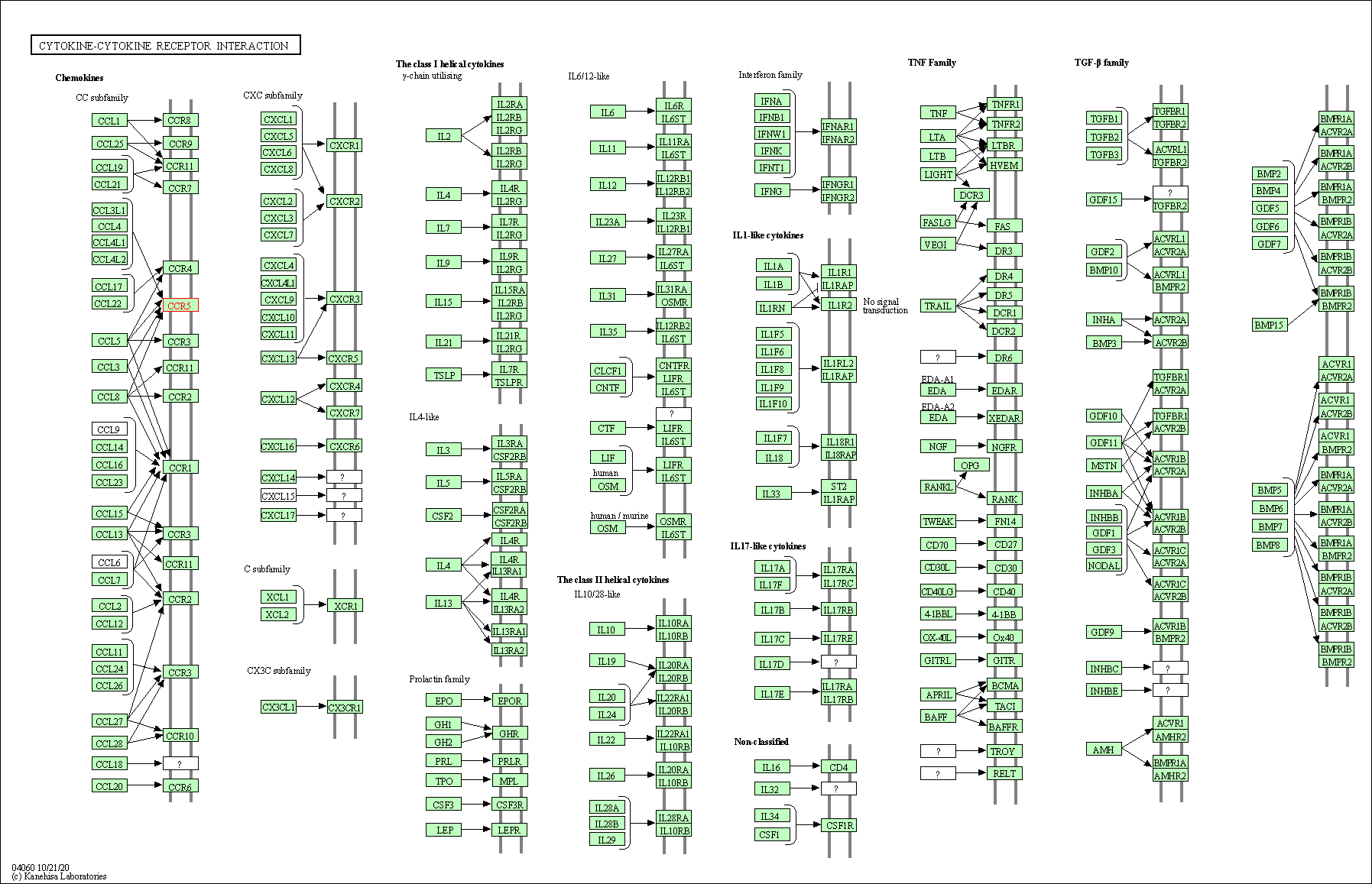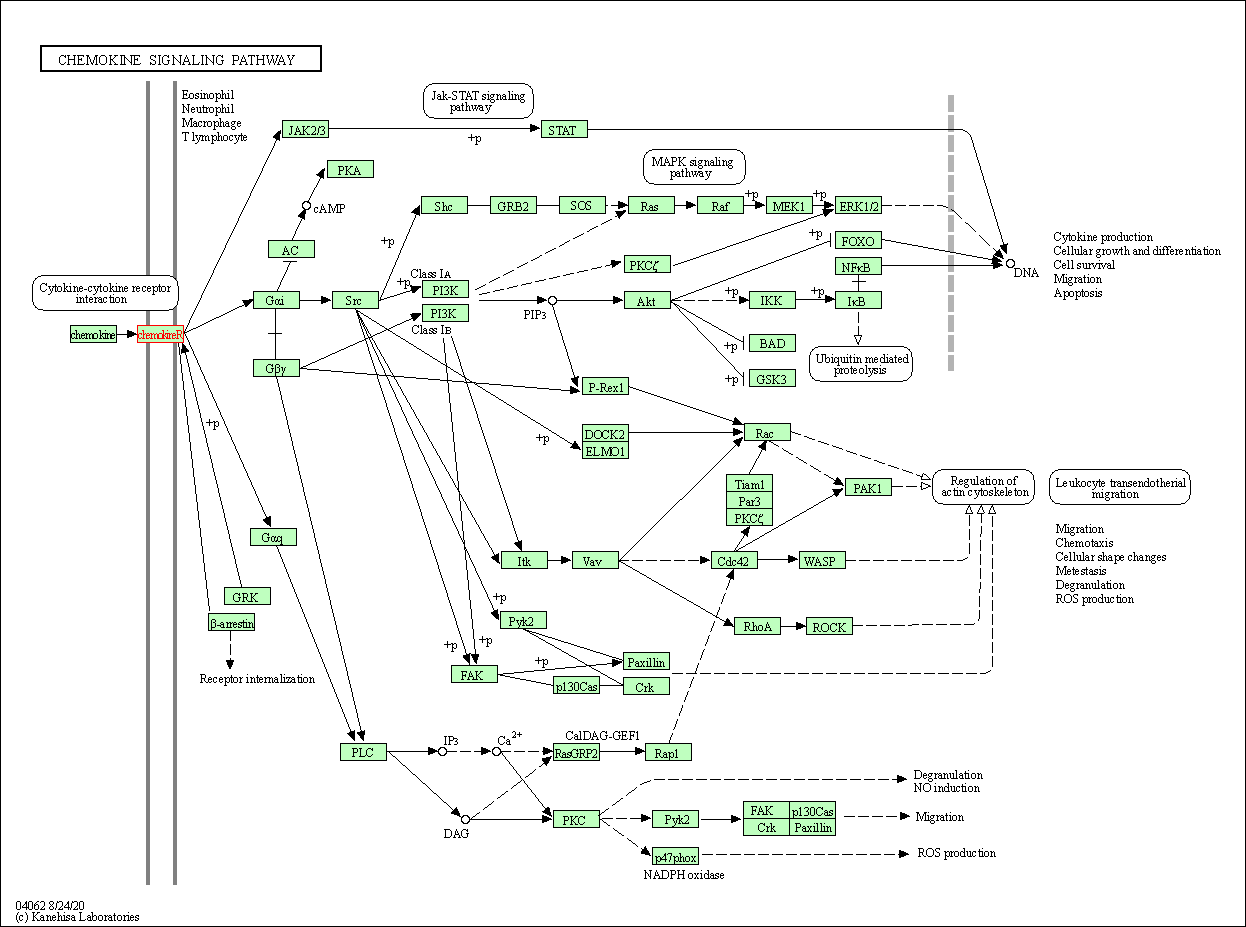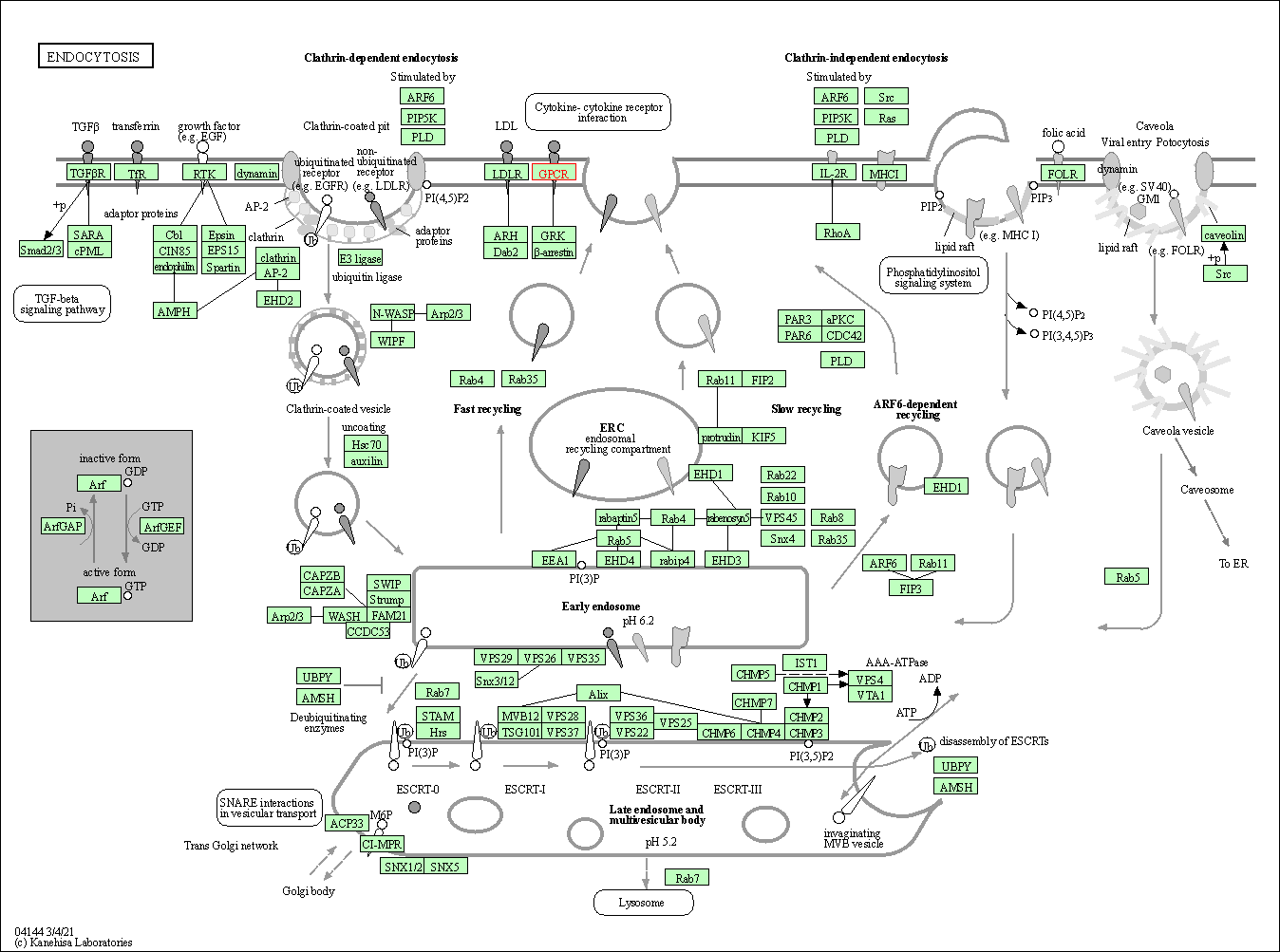Target Information
| Target General Information | Top | |||||
|---|---|---|---|---|---|---|
| Target ID |
T09960
(Former ID: TTDS00326)
|
|||||
| Target Name |
C-C chemokine receptor type 5 (CCR5)
|
|||||
| Synonyms |
HIV-1 fusion coreceptor; HIV-1 fusion co-receptor; Chemokine receptor CCR5; CMKBR5; CHEMR13; CD195 antigen; CD195; CCR-5; CC-CKR-5; C-C CKR-5
Click to Show/Hide
|
|||||
| Gene Name |
CCR5
|
|||||
| Target Type |
Successful target
|
[1] | ||||
| Disease | [+] 1 Target-related Diseases | + | ||||
| 1 | Human immunodeficiency virus disease [ICD-11: 1C60-1C62] | |||||
| Function |
May play a role in the control of granulocytic lineage proliferation or differentiation. Receptor for a number of inflammatory CC-chemokines including CCL3/MIP-1-alpha, CCL4/MIP-1-beta and RANTES and subsequently transduces a signal by increasing the intracellular calcium ion level.
Click to Show/Hide
|
|||||
| BioChemical Class |
GPCR rhodopsin
|
|||||
| UniProt ID | ||||||
| Sequence |
MDYQVSSPIYDINYYTSEPCQKINVKQIAARLLPPLYSLVFIFGFVGNMLVILILINCKR
LKSMTDIYLLNLAISDLFFLLTVPFWAHYAAAQWDFGNTMCQLLTGLYFIGFFSGIFFII LLTIDRYLAVVHAVFALKARTVTFGVVTSVITWVVAVFASLPGIIFTRSQKEGLHYTCSS HFPYSQYQFWKNFQTLKIVILGLVLPLLVMVICYSGILKTLLRCRNEKKRHRAVRLIFTI MIVYFLFWAPYNIVLLLNTFQEFFGLNNCSSSNRLDQAMQVTETLGMTHCCINPIIYAFV GEKFRNYLLVFFQKHIAKRFCKCCSIFQQEAPERASSVYTRSTGEQEISVGL Click to Show/Hide
|
|||||
| 3D Structure | Click to Show 3D Structure of This Target | AlphaFold | ||||
| HIT2.0 ID | T02OOS | |||||
| Drugs and Modes of Action | Top | |||||
|---|---|---|---|---|---|---|
| Approved Drug(s) | [+] 1 Approved Drugs | + | ||||
| 1 | Maraviroc | Drug Info | Approved | Human immunodeficiency virus infection | [2], [3], [4] | |
| Clinical Trial Drug(s) | [+] 11 Clinical Trial Drugs | + | ||||
| 1 | E-913 | Drug Info | Phase 3 | Human immunodeficiency virus infection | [5], [6] | |
| 2 | PRO-140 | Drug Info | Phase 3 | Human immunodeficiency virus infection | [7] | |
| 3 | Vicriviroc | Drug Info | Phase 3 | Human immunodeficiency virus infection | [8], [9] | |
| 4 | BMS-813160 | Drug Info | Phase 2 | Diabetic nephropathy | [15] | |
| 5 | PF-232798 | Drug Info | Phase 2 | Human immunodeficiency virus infection | [16] | |
| 6 | SB-728-T | Drug Info | Phase 2 | Human immunodeficiency virus infection | [7] | |
| 7 | Cal-1 | Drug Info | Phase 1/2 | Human immunodeficiency virus-1 infection | [17] | |
| 8 | CCR5 mab | Drug Info | Phase 1 | Human immunodeficiency virus infection | [18] | |
| 9 | INCB15050 | Drug Info | Phase 1 | Human immunodeficiency virus infection | [19] | |
| 10 | Tak-220 | Drug Info | Phase 1 | Human immunodeficiency virus-1 infection | [20], [21] | |
| 11 | VCH-286 | Drug Info | Phase 1 | Human immunodeficiency virus infection | [22] | |
| Discontinued Drug(s) | [+] 5 Discontinued Drugs | + | ||||
| 1 | GW873140 | Drug Info | Discontinued in Phase 3 | Human immunodeficiency virus-1 infection | [23], [24] | |
| 2 | AZD8566 | Drug Info | Discontinued in Phase 1 | Rheumatoid arthritis | [25] | |
| 3 | SCH-C | Drug Info | Discontinued in Phase 1 | Human immunodeficiency virus infection | [26], [27] | |
| 4 | AZD5672 | Drug Info | Terminated | Rheumatoid arthritis | [30], [31] | |
| 5 | CCR5Qb | Drug Info | Terminated | Human immunodeficiency virus infection | [32] | |
| Mode of Action | [+] 4 Modes of Action | + | ||||
| Antagonist | [+] 9 Antagonist drugs | + | ||||
| 1 | Maraviroc | Drug Info | [1], [33], [34] | |||
| 2 | E-913 | Drug Info | [35] | |||
| 3 | PRO-140 | Drug Info | [36] | |||
| 4 | Vicriviroc | Drug Info | [37] | |||
| 5 | PF-232798 | Drug Info | [16] | |||
| 6 | INCB15050 | Drug Info | [42] | |||
| 7 | VCH-286 | Drug Info | [22] | |||
| 8 | AZD8566 | Drug Info | [45] | |||
| 9 | AZD5672 | Drug Info | [45] | |||
| Modulator | [+] 4 Modulator drugs | + | ||||
| 1 | BMS-813160 | Drug Info | [38], [39] | |||
| 2 | SB-728-T | Drug Info | [40] | |||
| 3 | Cal-1 | Drug Info | [41] | |||
| 4 | NIFEVIROC | Drug Info | [52] | |||
| Binder | [+] 3 Binder drugs | + | ||||
| 1 | Tak-220 | Drug Info | [43] | |||
| 2 | GW873140 | Drug Info | [44], [43] | |||
| 3 | SCH-C | Drug Info | [43] | |||
| Inhibitor | [+] 8 Inhibitor drugs | + | ||||
| 1 | (2-(4-chlorobenzyloxy)-5-bromophenyl)methanamine | Drug Info | [47] | |||
| 2 | 4-(2-(4-chlorobenzyloxy)-5-bromobenzyl)morpholine | Drug Info | [48] | |||
| 3 | ANIBAMINE | Drug Info | [49] | |||
| 4 | CMPD-167 | Drug Info | [50] | |||
| 5 | GT-1282 | Drug Info | [51] | |||
| 6 | N-(2-(4-chlorobenzyloxy)-5-bromobenzyl)ethanamine | Drug Info | [47] | |||
| 7 | SCH-210971 | Drug Info | [53] | |||
| 8 | VARIECOLIN | Drug Info | [54] | |||
| Cell-based Target Expression Variations | Top | |||||
|---|---|---|---|---|---|---|
| Cell-based Target Expression Variations | ||||||
| Drug Binding Sites of Target | Top | |||||
|---|---|---|---|---|---|---|
| Ligand Name: Maraviroc | Ligand Info | |||||
| Structure Description | Crystal Structure of the CCR5 Chemokine Receptor | PDB:4MBS | ||||
| Method | X-ray diffraction | Resolution | 2.71 Å | Mutation | Yes | [55] |
| PDB Sequence |
PCQKINVKQI
28 AARLLPPLYS38 LVFIFGFVGN48 MLVILILINY58 KRLKSMTDIY68 LLNLAISDLF 78 FLLTVPFWAH88 YAAAQWDFGN98 TMCQLLTGLY108 FIGFFSGIFF118 IILLTIDRYL 128 AVVHAVFALK138 ARTVTFGVVT148 SVITWVVAVF158 ASLPNIIFTR168 SQKEGLHYTC 178 SSHFPYSQYQ188 FWKNFQTLKI198 VILGLVLPLL208 VMVICYSGIL218 KTLLRMKKYT 1005 CTVCGYIYNP1015 EDGDPDNGVN1025 PGTDFKDIPD1035 DWVCPLCGVG1045 KDQFEEVEEE 227 KKRHRDVRLI237 FTIMIVYFLF247 WAPYNIVLLL257 NTFQEFFGLN267 NCSSSNRLDQ 277 AMQVTETLGM287 THCCINPIIY297 AFVGEEFRNY307 LLVFFQ
|
|||||
|
|
TYR37
3.106
TRP86
3.510
TYR89
3.642
THR105
4.641
TYR108
3.619
PHE109
3.482
PHE112
3.714
PHE182
3.206
LYS191
3.757
GLN194
3.837
THR195
3.291
|
|||||
| Ligand Name: Oleic acid | Ligand Info | |||||
| Structure Description | Crystal Structure of CC Chemokine Receptor 5 (CCR5) in complex with high potency HIV entry inhibitor 5P7-CCL5 | PDB:5UIW | ||||
| Method | X-ray diffraction | Resolution | 2.20 Å | Mutation | Yes | [56] |
| PDB Sequence |
TSEPCQKINV
25 KQIAARLLPP35 LYSLVFIFGF45 VGNMLVILIL55 INYKRLKSMT65 DIYLLNLAIS 75 DLFFLLTVPF85 WAHYAAAQWD95 FGNTMCQLLT105 GLYFIGFFSG115 IFFIILLTID 125 RYLAVVHAVF135 ALKARTVTFG145 VVTSVITWVV155 AVFASLPNII165 FTRSQKEGLH 175 YTCSSHFPYS185 QYQFWKNFQT195 LKIVILGLVL205 PLLVMVICYS215 GILKTLLRMK 1002 KYTCTVCGYI1012 YNPEDGDPDN1022 GVNPGTDFKD1032 IPDDWVCPLC1042 GVGKDQFEEV 1052 EEEKKRHRDV234 RLIFTIMIVY244 FLFWAPYNIV254 LLLNTFQEFF264 GLNNCSSSNR 274 LDQAMQVTET284 LGMTHCCINP294 IIYAFVGEEF304 RNYLLVFFQK314 HI |
|||||
|
|
||||||
| Click to View More Binding Site Information of This Target with Different Ligands | ||||||
| Different Human System Profiles of Target | Top |
|---|---|
|
Human Similarity Proteins
of target is determined by comparing the sequence similarity of all human proteins with the target based on BLAST. The similarity proteins for a target are defined as the proteins with E-value < 0.005 and outside the protein families of the target.
A target that has fewer human similarity proteins outside its family is commonly regarded to possess a greater capacity to avoid undesired interactions and thus increase the possibility of finding successful drugs
(Brief Bioinform, 21: 649-662, 2020).
Human Pathway Affiliation
of target is determined by the life-essential pathways provided on KEGG database. The target-affiliated pathways were defined based on the following two criteria (a) the pathways of the studied target should be life-essential for both healthy individuals and patients, and (b) the studied target should occupy an upstream position in the pathways and therefore had the ability to regulate biological function.
Targets involved in a fewer pathways have greater likelihood to be successfully developed, while those associated with more human pathways increase the chance of undesirable interferences with other human processes
(Pharmacol Rev, 58: 259-279, 2006).
Biological Network Descriptors
of target is determined based on a human protein-protein interactions (PPI) network consisting of 9,309 proteins and 52,713 PPIs, which were with a high confidence score of ≥ 0.95 collected from STRING database.
The network properties of targets based on protein-protein interactions (PPIs) have been widely adopted for the assessment of target’s druggability. Proteins with high node degree tend to have a high impact on network function through multiple interactions, while proteins with high betweenness centrality are regarded to be central for communication in interaction networks and regulate the flow of signaling information
(Front Pharmacol, 9, 1245, 2018;
Curr Opin Struct Biol. 44:134-142, 2017).
Human Similarity Proteins
Human Pathway Affiliation
Biological Network Descriptors
|
|
| KEGG Pathway | Pathway ID | Affiliated Target | Pathway Map |
|---|---|---|---|
| Viral life cycle - HIV-1 | hsa03250 | Affiliated Target |

|
| Class: Genetic Information Processing => Information processing in viruses | Pathway Hierarchy | ||
| Virion - Human immunodeficiency virus | hsa03260 | Affiliated Target |

|
| Class: Genetic Information Processing => Information processing in viruses | Pathway Hierarchy | ||
| Cytokine-cytokine receptor interaction | hsa04060 | Affiliated Target |

|
| Class: Environmental Information Processing => Signaling molecules and interaction | Pathway Hierarchy | ||
| Viral protein interaction with cytokine and cytokine receptor | hsa04061 | Affiliated Target |

|
| Class: Environmental Information Processing => Signaling molecules and interaction | Pathway Hierarchy | ||
| Chemokine signaling pathway | hsa04062 | Affiliated Target |

|
| Class: Organismal Systems => Immune system | Pathway Hierarchy | ||
| Endocytosis | hsa04144 | Affiliated Target |

|
| Class: Cellular Processes => Transport and catabolism | Pathway Hierarchy | ||
| Click to Show/Hide the Information of Affiliated Human Pathways | |||
| Degree | 17 | Degree centrality | 1.83E-03 | Betweenness centrality | 6.23E-04 |
|---|---|---|---|---|---|
| Closeness centrality | 2.15E-01 | Radiality | 1.38E+01 | Clustering coefficient | 1.54E-01 |
| Neighborhood connectivity | 2.11E+01 | Topological coefficient | 1.00E-01 | Eccentricity | 12 |
| Download | Click to Download the Full PPI Network of This Target | ||||
| Chemical Structure based Activity Landscape of Target | Top |
|---|---|
| Drug Property Profile of Target | Top | |
|---|---|---|
| (1) Molecular Weight (mw) based Drug Clustering | (2) Octanol/Water Partition Coefficient (xlogp) based Drug Clustering | |
|
|
||
| (3) Hydrogen Bond Donor Count (hbonddonor) based Drug Clustering | (4) Hydrogen Bond Acceptor Count (hbondacc) based Drug Clustering | |
|
|
||
| (5) Rotatable Bond Count (rotbonds) based Drug Clustering | (6) Topological Polar Surface Area (polararea) based Drug Clustering | |
|
|
||
| "RO5" indicates the cutoff set by lipinski's rule of five; "D123AB" colored in GREEN denotes the no violation of any cutoff in lipinski's rule of five; "D123AB" colored in PURPLE refers to the violation of only one cutoff in lipinski's rule of five; "D123AB" colored in BLACK represents the violation of more than one cutoffs in lipinski's rule of five | ||
| Co-Targets | Top | |||||
|---|---|---|---|---|---|---|
| Co-Targets | ||||||
| Target Poor or Non Binders | Top | |||||
|---|---|---|---|---|---|---|
| Target Poor or Non Binders | ||||||
| Target Regulators | Top | |||||
|---|---|---|---|---|---|---|
| Target-interacting Proteins | ||||||
| Target Profiles in Patients | Top | |||||
|---|---|---|---|---|---|---|
| Target Expression Profile (TEP) | ||||||
| Target Affiliated Biological Pathways | Top | |||||
|---|---|---|---|---|---|---|
| KEGG Pathway | [+] 5 KEGG Pathways | + | ||||
| 1 | Cytokine-cytokine receptor interaction | |||||
| 2 | Chemokine signaling pathway | |||||
| 3 | Endocytosis | |||||
| 4 | Toxoplasmosis | |||||
| 5 | Viral carcinogenesis | |||||
| NetPath Pathway | [+] 3 NetPath Pathways | + | ||||
| 1 | TSLP Signaling Pathway | |||||
| 2 | TCR Signaling Pathway | |||||
| 3 | IL2 Signaling Pathway | |||||
| Panther Pathway | [+] 1 Panther Pathways | + | ||||
| 1 | Inflammation mediated by chemokine and cytokine signaling pathway | |||||
| PID Pathway | [+] 1 PID Pathways | + | ||||
| 1 | IL12-mediated signaling events | |||||
| Reactome | [+] 3 Reactome Pathways | + | ||||
| 1 | Binding and entry of HIV virion | |||||
| 2 | Chemokine receptors bind chemokines | |||||
| 3 | G alpha (i) signalling events | |||||
| WikiPathways | [+] 7 WikiPathways | + | ||||
| 1 | TCR Signaling Pathway | |||||
| 2 | GPCRs, Class A Rhodopsin-like | |||||
| 3 | HIV Life Cycle | |||||
| 4 | Peptide GPCRs | |||||
| 5 | GPCR ligand binding | |||||
| 6 | GPCR downstream signaling | |||||
| 7 | GPCRs, Other | |||||
| Target-Related Models and Studies | Top | |||||
|---|---|---|---|---|---|---|
| Target Validation | ||||||
| Target QSAR Model | ||||||
| References | Top | |||||
|---|---|---|---|---|---|---|
| REF 1 | Rapamycin enhances aplaviroc anti-HIV activity: implications for the clinical development of novel CCR5 antagonists. Antiviral Res. 2009 Jul;83(1):86-9. | |||||
| REF 2 | URL: http://www.guidetopharmacology.org Nucleic Acids Res. 2015 Oct 12. pii: gkv1037. The IUPHAR/BPS Guide to PHARMACOLOGY in 2016: towards curated quantitative interactions between 1300 protein targets and 6000 ligands. (Ligand id: 806). | |||||
| REF 3 | 2007 FDA drug approvals: a year of flux. Nat Rev Drug Discov. 2008 Feb;7(2):107-9. | |||||
| REF 4 | Emerging drugs for the treatment of chronic obstructive pulmonary disease. Expert Opin Emerg Drugs. 2006 May;11(2):275-91. | |||||
| REF 5 | URL: http://www.guidetopharmacology.org Nucleic Acids Res. 2015 Oct 12. pii: gkv1037. The IUPHAR/BPS Guide to PHARMACOLOGY in 2016: towards curated quantitative interactions between 1300 protein targets and 6000 ligands. (Ligand id: 3500). | |||||
| REF 6 | ClinicalTrials.gov (NCT00297076) Chemokine Coreceptor 5 (CCR5) Antagonist GW873140 In R5-Tropic Treatment-Experienced HIV-Infected Subjects. U.S. National Institutes of Health. | |||||
| REF 7 | Clinical pipeline report, company report or official report of the Pharmaceutical Research and Manufacturers of America (PhRMA) | |||||
| REF 8 | URL: http://www.guidetopharmacology.org Nucleic Acids Res. 2015 Oct 12. pii: gkv1037. The IUPHAR/BPS Guide to PHARMACOLOGY in 2016: towards curated quantitative interactions between 1300 protein targets and 6000 ligands. (Ligand id: 807). | |||||
| REF 9 | Emerging antiviral drugs. Expert Opin Emerg Drugs. 2008 Sep;13(3):393-416. | |||||
| REF 10 | ClinicalTrials.gov (NCT03902522) PRO 140 in Treatment-Experienced HIV-1 Subjects. U.S. National Institutes of Health. | |||||
| REF 11 | Trusted, scientifically sound profiles of drug programs, clinical trials, safety reports, and company deals, written by scientists. Springer. 2015. Adis Insight (drug id 800023697) | |||||
| REF 12 | ClinicalTrials.gov (NCT00979771) A Study to Investigate the Ability of GSK706769 to Maintain Clinical Remission After Withdrawal of Enbrel in Rheumatoid Arthritis Patients. U.S. National Institutes of Health. | |||||
| REF 13 | URL: http://www.guidetopharmacology.org Nucleic Acids Res. 2015 Oct 12. pii: gkv1037. The IUPHAR/BPS Guide to PHARMACOLOGY in 2016: towards curated quantitative interactions between 1300 protein targets and 6000 ligands. (Ligand id: 801). | |||||
| REF 14 | The dual CCR5 and CCR2 inhibitor cenicriviroc does not redistribute HIV into extracellular space: implications for plasma viral load and intracellular DNA decline. J Antimicrob Chemother. 2015 Mar;70(3):750-6. | |||||
| REF 15 | ClinicalTrials.gov (NCT01752985) Study to Evaluate the Effects of BMS-813160 on Protein Loss in the Urine of Subjects With Type 2 Diabetes and Diabetic Kidney Disease. U.S. National Institutes of Health. | |||||
| REF 16 | An imidazopiperidine series of CCR5 antagonists for the treatment of HIV: the discovery of N-{(1S)-1-(3-fluorophenyl)-3-[(3-endo)-3-(5-isobutyryl-2-methyl-4,5,6,7-tetrahydro-1H-imidazo[4,5-c]pyridin-1-yl)-8-azabicyclo[3.2.1]oct-8-yl]propyl}acetamide (PF-232798). J Med Chem. 2011 Jan 13;54(1):67-77. | |||||
| REF 17 | ClinicalTrials.gov (NCT01734850) Safety Study of a Dual Anti-HIV Gene Transfer Construct to Treat HIV-1 Infection. U.S. National Institutes of Health. | |||||
| REF 18 | CCR5 Monoclonal Antibodies for HIV-1 Therapy. Curr Opin HIV AIDS. 2009 March; 4(2): 104-111. | |||||
| REF 19 | Trusted, scientifically sound profiles of drug programs, clinical trials, safety reports, and company deals, written by scientists. Springer. 2015. Adis Insight (drug id 800025519) | |||||
| REF 20 | URL: http://www.guidetopharmacology.org Nucleic Acids Res. 2015 Oct 12. pii: gkv1037. The IUPHAR/BPS Guide to PHARMACOLOGY in 2016: towards curated quantitative interactions between 1300 protein targets and 6000 ligands. (Ligand id: 800). | |||||
| REF 21 | Trusted, scientifically sound profiles of drug programs, clinical trials, safety reports, and company deals, written by scientists. Springer. 2015. Adis Insight (drug id 800022281) | |||||
| REF 22 | The Continuing Evolution of HIV-1 Therapy: Identification and Development of Novel Antiretroviral Agents Targeting Viral and Cellular Targets. Mol Biol Int. 2012;2012:401965. | |||||
| REF 23 | URL: http://www.guidetopharmacology.org Nucleic Acids Res. 2015 Oct 12. pii: gkv1037. The IUPHAR/BPS Guide to PHARMACOLOGY in 2016: towards curated quantitative interactions between 1300 protein targets and 6000 ligands. (Ligand id: 805). | |||||
| REF 24 | Trusted, scientifically sound profiles of drug programs, clinical trials, safety reports, and company deals, written by scientists. Springer. 2015. Adis Insight (drug id 800018317) | |||||
| REF 25 | Trusted, scientifically sound profiles of drug programs, clinical trials, safety reports, and company deals, written by scientists. Springer. 2015. Adis Insight (drug id 800027710) | |||||
| REF 26 | URL: http://www.guidetopharmacology.org Nucleic Acids Res. 2015 Oct 12. pii: gkv1037. The IUPHAR/BPS Guide to PHARMACOLOGY in 2016: towards curated quantitative interactions between 1300 protein targets and 6000 ligands. (Ligand id: 804). | |||||
| REF 27 | Trusted, scientifically sound profiles of drug programs, clinical trials, safety reports, and company deals, written by scientists. Springer. 2015. Adis Insight (drug id 800014207) | |||||
| REF 28 | URL: http://www.guidetopharmacology.org Nucleic Acids Res. 2015 Oct 12. pii: gkv1037. The IUPHAR/BPS Guide to PHARMACOLOGY in 2016: towards curated quantitative interactions between 1300 protein targets and 6000 ligands. (Ligand id: 783). | |||||
| REF 29 | Trusted, scientifically sound profiles of drug programs, clinical trials, safety reports, and company deals, written by scientists. Springer. 2015. Adis Insight (drug id 800012061) | |||||
| REF 30 | URL: http://www.guidetopharmacology.org Nucleic Acids Res. 2015 Oct 12. pii: gkv1037. The IUPHAR/BPS Guide to PHARMACOLOGY in 2016: towards curated quantitative interactions between 1300 protein targets and 6000 ligands. (Ligand id: 7686). | |||||
| REF 31 | Preclinical and clinical investigation of a CCR5 antagonist, AZD5672, in patients with rheumatoid arthritis receiving methotrexate. Arthritis Rheum. 2010 Nov;62(11):3154-60. | |||||
| REF 32 | Trusted, scientifically sound profiles of drug programs, clinical trials, safety reports, and company deals, written by scientists. Springer. 2015. Adis Insight (drug id 800021743) | |||||
| REF 33 | Tyrosine sulfation of the amino terminus of CCR5 facilitates HIV-1 entry. Cell. 1999 Mar 5;96(5):667-76. | |||||
| REF 34 | Molecular cloning and functional expression of a new human CC-chemokine receptor gene. Biochemistry. 1996 Mar 19;35(11):3362-7. | |||||
| REF 35 | Species selectivity of small-molecular antagonists for the CCR5 chemokine receptor. Int Immunopharmacol. 2007 Dec 5;7(12):1528-34. | |||||
| REF 36 | Agonist-induced internalization of CC chemokine receptor 5 as a mechanism to inhibit HIV replication. J Pharmacol Exp Ther. 2011 Jun;337(3):655-62. | |||||
| REF 37 | HIV entry: new insights and implications for patient management. Curr Opin Infect Dis. 2009 Feb;22(1):35-42. | |||||
| REF 38 | A dual CCR2/CCR5 chemokine antagonist, BMS-813160. Expert Opin Ther Pat. 2011 Dec;21(12):1919-24. | |||||
| REF 39 | Methods for improving thymic recovery and preventing and treating graft versus host disease using ccr2 and ccr5 antagonists | |||||
| REF 40 | Gene Editing of CCR5 in Autologous CD4 T Cells of Persons Infected with HIV. N Engl J Med. 2014 March 6; 370(10): 901-910. | |||||
| REF 41 | Preclinical safety and efficacy of an anti-HIV-1 lentiviral vector containing a short hairpin RNA to CCR5 and the C46 fusion inhibitor. Mol Ther Methods Clin Dev. 2014 Feb 12;1:11. | |||||
| REF 42 | Incyte. Product Development Pipeline. | |||||
| REF 43 | Progress in targeting HIV-1 entry. Drug Discov Today. 2005 Aug 15;10(16):1085-94. | |||||
| REF 44 | In vitro and clinical investigation of the relationship between CCR5 receptor occupancy and anti-HIV activity of Aplaviroc. J Clin Pharmacol. 2008 Oct;48(10):1179-88. | |||||
| REF 45 | Clinical pipeline report, company report or official report of AstraZeneca (2009). | |||||
| REF 46 | Trusted, scientifically sound profiles of drug programs, clinical trials, safety reports, and company deals, written by scientists. Springer. 2015. Adis Insight (drug id 800021743) | |||||
| REF 47 | CCR5 receptor antagonists: discovery and SAR of novel 4-hydroxypiperidine derivatives. Bioorg Med Chem Lett. 2007 Apr 1;17(7):1883-7. | |||||
| REF 48 | CCR5 receptor antagonists: discovery and SAR study of guanylhydrazone derivatives. Bioorg Med Chem Lett. 2007 Jan 1;17(1):231-4. | |||||
| REF 49 | Isolation and structure of antagonists of chemokine receptor (CCR5). J Nat Prod. 2004 Jun;67(6):1036-8. | |||||
| REF 50 | URL: http://www.guidetopharmacology.org Nucleic Acids Res. 2015 Oct 12. pii: gkv1037. The IUPHAR/BPS Guide to PHARMACOLOGY in 2016: towards curated quantitative interactions between 1300 protein targets and 6000 ligands. (Ligand id: 3651). | |||||
| REF 51 | Reduced cardiac side-effect potential by introduction of polar groups: discovery of NIBR-1282, an orally bioavailable CCR5 antagonist which is acti... Bioorg Med Chem Lett. 2008 Mar 15;18(6):2000-5. | |||||
| REF 52 | Determination of nifeviroc, a novel CCR5 antagonist: application to a pharmacokinetic study. J Pharm Biomed Anal. 2011 Nov 1;56(3):637-40. | |||||
| REF 53 | Chemokine receptor CCR-5 inhibitors produced by Chaetomium globosum. J Nat Prod. 2006 Jul;69(7):1025-8. | |||||
| REF 54 | Inhibition of the human chemokine receptor CCR5 by variecolin and variecolol and isolation of four new variecolin analogues, emericolins A-D, from ... J Nat Prod. 2004 Oct;67(10):1681-4. | |||||
| REF 55 | Structure of the CCR5 chemokine receptor-HIV entry inhibitor maraviroc complex. Science. 2013 Sep 20;341(6152):1387-90. | |||||
| REF 56 | Structure of CC Chemokine Receptor 5 with a Potent Chemokine Antagonist Reveals Mechanisms of Chemokine Recognition and Molecular Mimicry by HIV. Immunity. 2017 Jun 20;46(6):1005-1017.e5. | |||||
If You Find Any Error in Data or Bug in Web Service, Please Kindly Report It to Dr. Zhou and Dr. Zhang.

